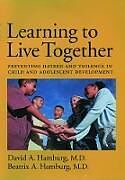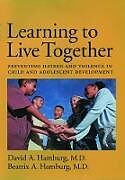Learning to Live Together
Einband:
Fester Einband
EAN:
9780195157796
Untertitel:
Preventing Hatred and Violence in Child and Adolescent Development
Genre:
Psychologie & Esoterik
Autor:
David A. Hamburg, Beatrix A. Hamburg
Herausgeber:
Oxford University Press
Anzahl Seiten:
432
Erscheinungsdatum:
22.04.2004
ISBN:
978-0-19-515779-6
Zusatztext Anyone living in a violent community can gain hope from this book, written for educationalists, parents, and community workers. Klappentext With a view to deepening our understanding of sources of hatred and prejudice! this book uses a developmental and evolutionary perspective to explore and explain the process by which our beliefs are conveyed to the youngest members of society. Discussing the psychological obstacles to peacefulrelations between groups! the authors focus on the developmental processes by which we can work to diminish ethnocentrism! prejudice! and hatred! which children learn from a very early age. Until now! scholarship and practice in international relations have gravely neglected crucial psychologicalaspects of these terrible problems and have not yet explored the educational opportunities related to them. Addressing these promising lines of inquiry and innovation! this book fosters a more humane and less violent development in childhood and adolescence. Educators! religious leaders! developmental and social psychologists! will find this a valuable resource! as will a socially concerned segment of the public who are looking for practical ways to work for peace. Zusammenfassung The aim of the book is to enhance understanding of the great danger and some sources of animosity between human groups and to focus on developmental processes by which it should be possible to diminish orientations of ethnocentrism, prejudice and hatred.Teaching prejudice and ethnocentrism to children has, all too often in so many places, been virtually automatic and has been conducive to terrible harm in the past. The dangers of hateful outlooks are likely to be much greater as the twenty-first century unfolds.Scholarship and practice in international relations, including war and peace issues, have gravely neglected the crucial psychological aspects of these terrible problems and the educational opportunities. There is a fruitful conjunction of developmental and social psychology in understanding such vital issues and in working toward a more humane, democratic and safe course of adolescent and child development than can in turn affect the safety of humanity in the long run. There are many intriguing examples of research, educational innovations, and visionary leadership in several countries. Most of the book is devoted to promising lines of inquiry and innovation that foster a more humane and less violent development in childhood and adolescence. It should be of interest to scholars, to the education community, and to a well-educated and socially concerned segment of the community....
Klappentext
With a view to deepening our understanding of sources of hatred and prejudice, this book uses a developmental and evolutionary perspective to explore and explain the process by which our beliefs are conveyed to the youngest members of society. Discussing the psychological obstacles to peaceful
relations between groups, the authors focus on the developmental processes by which we can work to diminish ethnocentrism, prejudice, and hatred, which children learn from a very early age. Until now, scholarship and practice in international relations have gravely neglected crucial psychological
aspects of these terrible problems and have not yet explored the educational opportunities related to them. Addressing these promising lines of inquiry and innovation, this book fosters a more humane and less violent development in childhood and adolescence. Educators, religious leaders,
developmental and social psychologists, will find this a valuable resource, as will a socially concerned segment of the public who are looking for practical ways to work for peace.
Zusammenfassung
The aim of the book is to enhance understanding of the great danger and some sources of animosity between human groups and to focus on developmental processes by which it should be possible to diminish orientations of ethnocentrism, prejudice and hatred. Teaching prejudice and ethnocentrism to children has, all too often in so many places, been virtually automatic and has been conducive to terrible harm in the past. The dangers of hateful outlooks are likely to be much greater as the twenty-first century unfolds. Scholarship and practice in international relations, including war and peace issues, have gravely neglected the crucial psychological aspects of these terrible problems and the educational opportunities. There is a fruitful conjunction of developmental and social psychology in understanding such vital issues and in working toward a more humane, democratic and safe course of adolescent and child development than can in turn affect the safety of humanity in the long run. There are many intriguing examples of research, educational innovations, and visionary leadership in several countries. Most of the book is devoted to promising lines of inquiry and innovation that foster a more humane and less violent development in childhood and adolescence. It should be of interest to scholars, to the education community, and to a well-educated and socially concerned segment of the community.
Inhalt
1. Growing Up in the Twenty-First Century; 2. Child Development, the Human Group, and Survival; 3. Ethnic, Religious, and Nationalist Factors in Human Conflict; 4. Teaching Hatred; 5. Development of Prosocial Behavior; 6. Violence Prevention in the Context of Child and Adolescent Development; 7. Contact, Intergroup Relations, and Opportunities for Education; 8. Cooperative Learning; 9. A Framework for Understanding and Addressing School Violence; 10. Education for Conflict Resolution: From Public Concern to Research to Practice; 11. Exemplary Programs of Conflict-Resolution Education; 12. Community Service: Preparation for Socially Responsible Adulthood; 13. Media as an Educational System: Can the Media Help?; 14. Information Technology: Its Potential to Educate for Peace; 15. International Education: A Global Outlook; 16. Education for Peace: Concepts and Institutions; 17. Putting Education for Peace into Practice; 18. Educating for Peace: The Role of Universities; 19. Overview: Toward a Better World for Our Grandchildren; Epilogue

Leider konnten wir für diesen Artikel keine Preise ermitteln ...
billigbuch.ch sucht jetzt für Sie die besten Angebote ...
Die aktuellen Verkaufspreise von 6 Onlineshops werden in Realtime abgefragt.
Sie können das gewünschte Produkt anschliessend direkt beim Anbieter Ihrer Wahl bestellen.
Loading...
Die aktuellen Verkaufspreise von 6 Onlineshops werden in Realtime abgefragt.
Sie können das gewünschte Produkt anschliessend direkt beim Anbieter Ihrer Wahl bestellen.
| # | Onlineshop | Preis CHF | Versand CHF | Total CHF | ||
|---|---|---|---|---|---|---|
| 1 | Seller | 0.00 | 0.00 | 0.00 |
